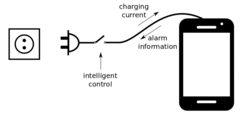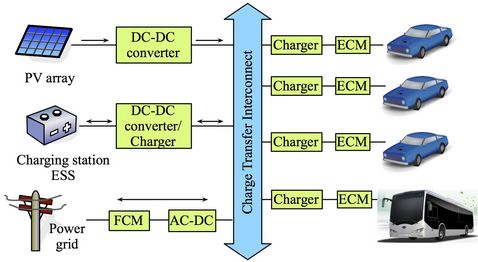Battery Management
Introduction
Nowadays, we are surrounded by all kinds of mobile systems and they have become an indispensable part of our lives. These systems come at various sizes and have various applications. They could be smartphones or laptops and also electric vehicles or stationary storage systems or even drones. All of them require an energy source to ensure their faultless operation. For many system this energy comes from a battery. Currently Li-ion batteries are favoured by many designers as they have high energy density and good power capability.
In order to operate systems safely and to ensure optimal battery usage, a battery management system is required. To get the most out of the battery and to enlarge long usage time of the system, battery aware system design is required.
Research Problems
Smart Charger

Many smartphone users have made the experience that the battery needs to be replaced after one or two years of usage because the capacity has dramatically decreased and the battery needs to be recharged several times per day. This is due to capacity fading in Li-ion batteries. One of the factors that accelerate the battery degradation is a high average state of charge. Our smart charger monitors the user behaviour and schedules the charging process such that the average state of charge is influenced in a positive manner and ageing is mitigated. Possible triggers for enabling the charging process are the alarm clock or prediction of the upcoming charging event based on past user behaviour.
Cell Balancing
Battery packs of electric vehicles consist of multiple cells connected in series and parallel. Due to manufacturing inhomogeneities and temperature variations, the states of charge of individual cells drift apart. This is undesired as to ensure pack safety the pack may not be over- or undercharged and therefore the overall pack charge is limited by the weakest cell. Cell balancing aims at elimination of the unbalance. Passive cell balancing, which is currently the most widely applied, dissipates excess energy as heat over a resistor. More advanced approaches redistribute available charge among cells to equalize their states of charge. We research on optimal balancing strategies that increase driving range on a single trip but also over the service life of the pack.
Drone Delivery

Companies in private sector are investigating the potential of drones delivery business in various aspects. For example, Amazon Prime Air is targeting to deliver products to doorsteps of customers within 30 minutes of ordering. It targets packages weighing less than 5 pounds, with a delivery distance of less 10 miles. DHL’s parcelcopter has shown its capability of delivering products to remote locations.
In presence of thousands of drones, battery management will be one of the major factors affecting the time-to-delivery and profitability of the drone deliver business. We find many research problems regarding battery identification, charge scheduling, battery sizing, and drone-battery mapping, which would be interesting to solve.
Stationary Storages

This topic investigates the usage of stationary storages connected to the grid. One topic we investigate is stationary storages for electric vehicle (EV) charging stations. EVs suffer from long charging times and short- drive ranges limiting EV usage to daily short-range commuting rather than general purpose use. The public EV charging station architecture has benefits in that it allows an efficient investment of costly equipments, and a long-range travel which requires multiple charging cycles. We investigate how use of energy storage and PV array could lower the electricity bill in such charging architectures.
Selected Publications
- Alma Pröbstl, Philipp Kindt, Emanuel Regnath, Samarjit Chakraborty. Smart2: Smart Charging For Smart Phones. 21st IEEE International Conference on Embedded and Real-Time Computing Systems and Applications (RTCSA), 2015
- Sangyoung Park, Licong Zhang, Samarjit Chakraborty, Battery assignment and scheduling for drone delivery businesses, IEEE/ACM International Symposium on Low Power Electronics and Design (ISLPED), 2017
- Sangyoung Park, Licong Zhang, Samarjit Chakraborty, Design space exploration of drone infrastructure for large-scale delivery services, IEEE/ACM International Conference on Computer-Aided Design (ICCAD), 2016